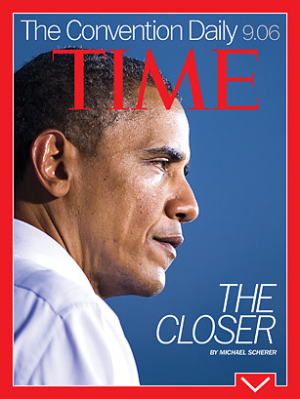Barack Obama is a man of big speeches, the sort that get named after cities: Boston in 2004, Berlin and Denver in 2008, Cairo and Prague in 2009. In Strasbourg, France, he addressed all of Europe, in Moscow the Russian elite, in Shanghai the youth of China. His Inaugural Address drew about 1.8 million people to the frozen National Mall, and his prime-time rhetorical interruptions since then have marked his presidency like a grandfather-clock chime: the joint sessions of Congress, the State of the Unions, the East Room announcements of the killing of Osama bin Laden and the debt-ceiling deadlock.
Bill Clinton was known for winning small rooms and street corners. George W. Bush had a knack for nicknames that made everyone feel like they were part of the gang. Obama tends to soar above, the prof who can also preach, drawing both from the rhetorical traditions of the civil rights movement and law-school lecture halls. As he famously (and immodestly) told Senate majority leader Harry Reid after one barn burner, “Harry, I have a gift.”
(MORE: Bill Clinton Makes His Case for Obama)
On Thursday, the President will count on that gift to give again. His speech in Charlotte, N.C., after 10 p.m. E.T., will probably be his last opportunity to lay out his plans for a second term in the format he most favors. With the polls showing him teetering on the knife edge of victory or defeat, the stakes are, as always, far too high. White House advisers say they don’t expect a big bump in the polls after the convention; the electorate is still too static. But they are counting on Obama to clear another campaign hurdle by clearly explaining to the American people why the next four years of his presidency will be better than the last. It’s a vision he has yet to present in full.

Cover Photograph by Brooks Kraft / Corbis for TIME
Obama set up his convention speech in May, when he officially launched his campaign in Columbus, Ohio. The question for the coming campaign, he said, was not whether the U.S. is better off than it was four years ago. “The real question — the question that will actually make a difference in your life and in the lives of your children — is not just about how we’re doing today,” he said. “It’s about how we’ll be doing tomorrow.”
(PHOTOS: The Democratic National Convention)
Since then, Obama has tried to frame the election as a choice between policies that will help the wealthy and policies that will help the middle class. That contrast will no doubt form the core of Obama’s address, much as it did in Denver in 2008, when Obama said of his opponent, John McCain, “It’s not because John McCain doesn’t care. It’s because John McCain doesn’t get it.” But contrast is not enough. Obama, advisors say, needs to make a positive case for his own presidency continuing. He needs to paint a vision of a post-crisis, post-dysfunction Obama presidency.
(PHOTOS: The Obama Brand)
In 2008, it was relatively easy to cast a positive vision. Obama was the newcomer who could promise change. “I stand before you tonight because all across America something is stirring,” he said. Today he is the incumbent who admits there is frustration that not enough has changed. To date, his campaign stump speech has leaned heavily on policy, offering warnings about the agenda of Mitt Romney on everything from student loans to Medicare, green energy and tax policy. His frame is simple: the U.S. can go forward or backward.
Expect those themes again. But a repeat of his stump speech will not be enough. Thursday will mark his one chance to share with the country his vision of what will happen if he wins a second term, to define forward as more than just a slogan. His grade for himself is incomplete, and his strategists are all too aware that many Americans have lost sight, and faith, in his ability to complete the job. Now is his chance to tell the American people what they are voting for, not just what they are voting against. And the stage is the one he prefers.

